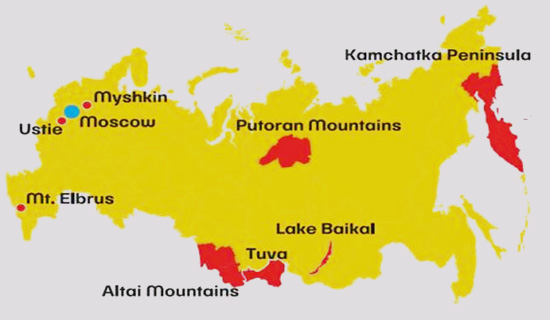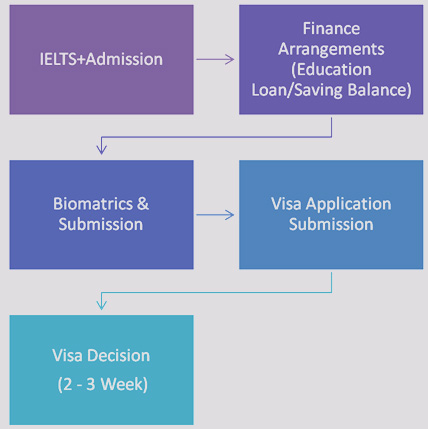Study in Russia
About Russia
- Full Name: The Union of Soviet Socialist Republics (also known as the USSR or Soviet Union for short) consisted of Russia and surrounding countries
- Climate: humid and warm to hot summers and cold winters.
- Languages: Russian
- Capital: Moscow
- Currency: Russian ruble (RUR)

Education Structure:
Higher professional education (engineering, economic, humanities specialties)
- “Bachelor of Science” degree: course duration – 4 years;
- “Master of Science” degree: course duration – 2 years;
- “Specialist” or “Engineer-specialist” qualification: course duration – 5 years;
- Post-graduate studies (leading to PhD): course duration – 3 years.
Higher professional medical education
- General medicine: course duration – 6 years;
- Sports medicine: course duration – 6 years;
- Pediatrics: course duration – 6 years;
- Dentistry: course duration – 5 years;
- Pharmacy: course duration – 5 years;
- Clinical psychology: course duration – 5 years.
Postgraduate medical education
- Internship: course duration – 1 year;
- Clinical residency: course duration – from 2 to 5 years (depending on the specialty and the doctor’s wishes);
- PhD: course duration – 3 years.
One academic year in Russian Universities lasts for 10 months (September 1st – June 30th). The academic year is divided into two semesters: the first semester is September 1st – January 25th; the second semester is February 9th – June 30th. At the end of each semester (January and June) students take tests and exams in the disciplines that they have studied. Between semesters students have vacations: winter vacation (2 weeks: from 25th January to 9th February), and summer vacation (2 months: from 1st July to 30th August). During winter and summer vacations students may either stay in Russia or travel home
Why Study in Russia?
1. The Russian higher education system consists of more than 650 state universities where about 7 million people study; more than 165 000 of these come from about 200 different countries.
2. Russian higher education offers a wealth of choice from more than 200 medical, engineering, economic and humanities specialties.
3. Russian higher education is based on the world-renowned school of fundamental and applied science, at the base of which lie the great discoveries of Russian scientists, which determined the course of developments in world science for many centuries ahead.
4. Russian higher education gives the possibility of access to the most modern laboratories and scientific-technical centers.
5. The highly qualified teaching personnel of Russian state universities (on average 80% of professors hold Ph.D. degrees) guarantee top-quality education.
6.Russian higher education consists of prestigious universities with more than 100 years of history and globally respected degrees which are recognized all over the world.
7. The study of foreign citizens at Russian state universities is up to 80% subsidized by the Government of Russia, making it affordable (the average cost of an academic year, including accommodation in a student hostel, is 2500-4000 USD).
8. Russian higher education gives an excellent opportunity to get to know a country which has a lot to offer – a unique cultural and historical heritage, the incomparable beauty of its natural landscapes and climatic zones, the diversity of architectural styles in its biggest cities, and the rich traditions and customs of more than 160 nationalities living in Russia.
Application Procedure:
Applications for study on a foundation course are accepted from March to October. Classes start from September. It is recommended that students arrive no later than month of November for study on foundation courses.
Applications for study on main courses are accepted from March to August. Classes start from September.A foreign citizen can be admitted to Russian state university if the following requirements are met:
For Bachelor’s or Specialist’s programs, if
He/she has a document of complete secondary education or any other equivalent document;
For Master’s program, if
he/she has a “Bachelor’s degree” or a “Specialist’s degree” with the course duration not less than 4 years;
For postgraduate studies (PhD), if
He/she has a “Master’s degree” (with the course duration not less than 2 years) or a “Specialist’s degree” with the course duration not less than 5 years
For postgraduate medical studies (internship, clinical residency), if
He/she has a degree of higher medical /dental/pharmaceutical education
The requirements for educational documents of foreign citizens are based on the requirements and legislation of the country. All foreign citizens who enter Russian universities are enrolled to study on the basis of entrance assessments (interview, testing), but on a non-competitive basis and without entrance examinations. Exception is made for the specialties of culture and art, where students are required to present artwork and/or demonstrate creative ability.
Applying for VISA:

Documents required for applying VISA:
Upon receiving the “invitation letter for study”, the student should refer to the Embassy/General Consulate of the Russian Federation in his / her country in order to apply for a student visa. Usually the following documents are required:
1. Passport
2. Completed application form
3. 3 photographs (3x4cm)
4. Original of the “invitation letter for study”
5. Original of medical health certificate, including chest X-ray result;
6. Original of negative HIV test results;
7. Certificate of complete higher secondary education;
8. Official bank documents (receipt) confirming full payment of tuition fees for the first academic year
Funds:
Tuition Fee
Tuition fees at universities are very nominal and can vary between FF 800 to FF 4500 per annum. At the GrandesEcoles the fee ranges between FF 25000 to FF 100000 per annum.
Living Expenses
Accommodation – FF 800 to FF 2500 per month
Food – FF 850 to FF 1000 at university restaurants per month
Health care – FF 2500 to FF 5000 per year
Miscellaneous (transportation and leisure) – FF 500 per month
The above costs are indicative and can vary from person to person and between universities.
